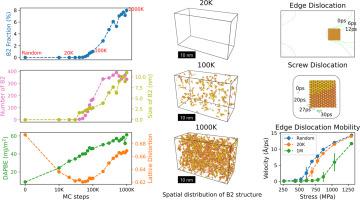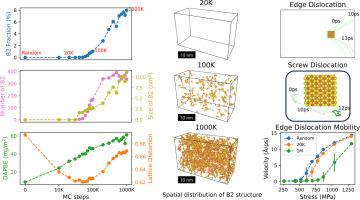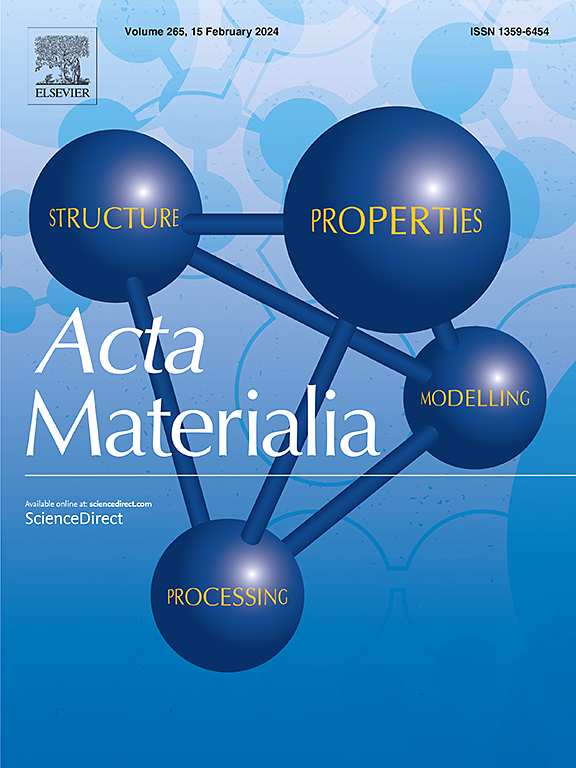Nanostructure and dislocation interactions in refractory complex concentrated alloy: From chemical short-range order to nanoscale B2 precipitates
IF 8.3
1区 材料科学
Q1 MATERIALS SCIENCE, MULTIDISCIPLINARY
引用次数: 0
Abstract
Refractory complex concentrated alloys (RCCAs) have emerged as a promising class of structural materials, demonstrating exceptional mechanical performance in aggressive environments. However, the complex atomic environments, significant lattice distortion, and vast compositional space of RCCAs present challenges to understanding the mechanisms that govern structure-property relationships. In this study, we explore the dislocation mechanisms in three model quaternary RCCAs, namely Mo25Nb10Ta25W40 (at. %), Mo25Nb25Ta25W25, and Mo25Nb40Ta25W10 using large-scale atomistic simulations and machine learning based Spectral Neighbor Analysis Potential. Our atomistic simulations examine how the chemical composition and local ordering influence the mobility of both edge and screw dislocations, and how lattice distortion and diffuse anti-phase boundary energy (DAPBE) affect dislocation behaviors during nanostructural evolution. Notably, with the increase in Nb concentration in the model RCCAs, both DAPBE and lattice distortion are simultaneously enhanced as the chemical short-range order (CSRO) evolves into nanoscale B2 precipitates. This evolution results in high lattice distortion due to the lattice mismatch between B2 precipitates and the random matrix. Consequently, B2 nanoprecipitates provide a stronger pinning effect, hindering edge dislocation motion while promoting cross-slip of screw dislocations, leading to a reduced screw-to-edge ratio in slip resistance and mobility discrepancy. These findings offer valuable insights into dislocation behaviors and interactions with ordered precipitates, highlighting the importance of exploring non-equiatomic compositions and advancing beyond CSRO in RCCAs. This study has implications for optimizing alloy compositions and processing methods for superior performance in aggressive environments.


难熔复杂浓缩合金中的纳米结构和位错相互作用:从化学短程有序到纳米级 B2 沉淀
难熔复杂浓缩合金(RCCAs)已成为一类前景广阔的结构材料,在侵蚀性环境中表现出卓越的机械性能。然而,RCCAs 复杂的原子环境、显著的晶格畸变和广阔的成分空间为了解结构-性能关系的作用机制带来了挑战。在本研究中,我们利用大规模原子模拟和基于机器学习的谱邻分析势,探索了三种四元模型 RCCAs(即 Mo25Nb10Ta25W40 (at. %)、Mo25Nb25Ta25W25 和 Mo25Nb40Ta25W10)中的位错机制。我们的原子模拟研究了化学成分和局部有序如何影响边缘位错和螺旋位错的迁移率,以及晶格畸变和扩散反相边界能(DAPBE)如何在纳米结构演化过程中影响位错行为。值得注意的是,随着模型 RCCAs 中铌浓度的增加,化学短程有序(CSRO)演变为纳米级 B2 沉淀,DAPBE 和晶格畸变同时增强。由于 B2 沉淀和无规基体之间的晶格失配,这种演化导致了高晶格畸变。因此,B2 纳米析出物提供了更强的钉扎效应,阻碍了边缘位错运动,同时促进了螺钉位错的交叉滑移,导致滑移阻力和迁移率差异中的螺钉与边缘比率降低。这些发现为了解位错行为以及与有序析出物的相互作用提供了宝贵的见解,突出了在 RCCAs 中探索非等原子成分和超越 CSRO 的重要性。这项研究对于优化合金成分和加工方法,从而在侵蚀性环境中获得优异性能具有重要意义。
本文章由计算机程序翻译,如有差异,请以英文原文为准。
求助全文
约1分钟内获得全文
求助全文
来源期刊

Acta Materialia
工程技术-材料科学:综合
CiteScore
16.10
自引率
8.50%
发文量
801
审稿时长
53 days
期刊介绍:
Acta Materialia serves as a platform for publishing full-length, original papers and commissioned overviews that contribute to a profound understanding of the correlation between the processing, structure, and properties of inorganic materials. The journal seeks papers with high impact potential or those that significantly propel the field forward. The scope includes the atomic and molecular arrangements, chemical and electronic structures, and microstructure of materials, focusing on their mechanical or functional behavior across all length scales, including nanostructures.
 求助内容:
求助内容: 应助结果提醒方式:
应助结果提醒方式:


